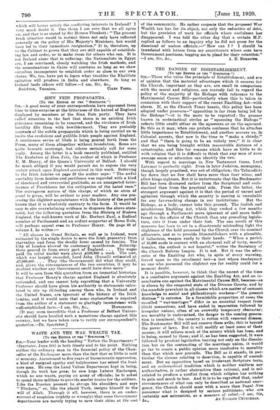THE DANGER OF DISESTABLISITMENT. [To sem EDITOR or THE "
Speoraeoe."] SIR,—Those who value the principle of Establishment, and are of opinion that the material advantages which it 'secures for the Church, important as they are, are small in comparison with the moral and religious, can scarcely fail to regard the policy of the majority of the Bishops with reference to the Matrimonial Causes Bill—particularly when this is 'taken in connexion with their support of the recent Enabling Act—with alarm. If, as the Church Times boasts, this policy has been adopted under pressure—" opposition is far from being led by the Bishops"—it is the more to be regretted: the process known in ecclesiastical circles as " squeezing the Bishops " reflects little credit either on the squeezers or on the squeezed. Be this as it may, when one prelate confesses that he attaches little importance to Establishment, and another assures us, In Colonial accents, that now is the time to "make a shindy," and that " there is going to be an unholy row," it is clear that we are being brought -within measurable distance of a catastrophe, and this for reasons which have so little to do with religion that it is difficult to 'think that any man of even average sense or education can identify the two.
With regard to marriage in New Testament times, Lord Latymer is perfectly right. Even in later Judaism, monegamy, though largely practised, was not of obligation; the Talmudists lay down that no Jew shall have more than four wives, and allow kings eighteen. But it is unfortunate that the Backmaster Bill has been dismissed rather from the Scriptural and eccle- siastical than from the practical side. From the latter, the strongest argument against it is that the period of unrest and agitation through which the country is passing is unsuitable
for any far-reaching change in our institutions. But the Bishops, as a body, cannot take this ground. The foolish and mischievous Enabling Act, which they rushed a few months ago through a Parliament more ignorant of and more indif- ferent to the affairs of the Church than any preceding legisla- ture, cuts it from under their feet. The one result of this measure has been to set in a disastrously misleading light the slightness of the hold possessed by the Church over its nominal adherents, and so to provide Disestablishers with a plausible, if fallacious, weapon ready to their hands. " When a parish of 16,000 souls is content with an electoral roll of forty, mostly females, the outlook is not hopeful," writes the Secretary of the Church Reform League. It is not. Bat it was the advo- cates of the Enabling Act who, in spite of -every warning, forced upon us the enrolment test—a test whose inadequacy no one who possessed the slightest eye for reality could for a moment doubt.
It is possible, however, to think that the unrest of the time is a conclusive argument against the Enabling Act, and an in- conclusive one against the Matrimonial Causes Bill, because—as is shown by the congested state of the Divorce Courts, and by the scandals prevalent in all classes which are matter of common knowledge to social and philanthropic workers—" the present distress" is extreme. In a formidable proportion of oases the so-called " war-manages" differ in no essential respect from illicit connexions, and have ended in separation followed by irregular unions, often of an avowedly temporary character; sex morality is undermined, the danger to the coming genera- tion is imminent, the country is rotten with venereal disease. The Buckmaster Bill will not remove these evils; this is beyond the power of laws. But it will modify at least some of their causes; it will relieve much of the misery which has been, and is being, caused by them; and if, as has been suggested, it were followed by prudent legislation bearing not only on the dissolu- tion but on the contracting of the marriage union, it wonld go far to create a public opinion more conducive to morality than that which now prevails. The Bill as it -stands, in par- ticular the clauses relating to desertion, is capable of amend- ment. But an opposition based on irrelevant Scripture texts, and an ecclesiastical tradition which is neither uniform nor authoritative, is rather obstructive than rational, and is cal- culated to produce a conflict from which religion has nothing to gain and much to lose. And it into be regretted that, under circumstances of what can only be:described as national emer- gency, the Church should meet with a more than Papal Non possumus what is designed by serious politicians, who are certainly not extremists, as a measure of relief.—I am, Sir, AN ENGLISH CHURCHMAN.






































 Previous page
Previous page